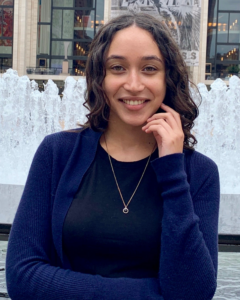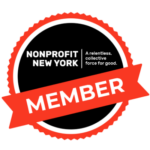
There’s a brand new music therapy class for young children (ages 2-3) opening up this year at Bloomingdale and we are excited to spread the word! But we also know some of you are asking… “What is music therapy and who is it for?” We spoke with Bloomingdale’s music therapist, Yanitza Lee, who will be running the music therapy class Music Wellness Mornings this Spring.
Interviewer:
Hi Yanitza, thank you for joining me today!
Yanitza Lee:
Of course, it’s my pleasure!
Interviewer:
My first question is “How would you break down the benefits of music therapy for children”?
Yanitza:
There are many different ways to break down music therapy. I see music therapy as a therapeutic experience that utilizes musical instruments to aid in a child’s development in all aspects of their biology, whether it’s physical, social, or emotional. It’s a safe space that includes every type of child at any stage of their development.
Interviewer:
Where did you study how to be a music therapist?
Yanitza:
I received my master’s degree at NYU in Music Therapy. It was a two-year program that involved coursework in music therapy, learning the field, as well as two years of fieldwork at internships.
Interviewer:
Amazing! I’m curious, what would a typical Music Wellness Mornings class look like?
Yanitza:
Okay… so a typical class goes like this: We start with a ‘Hello Song’ to help everyone get to know each other. Then we do warm-up activities with small percussion instruments to create a fun atmosphere. Children, parents, and caregivers all join in together! Next, we have our main activities. At the end of the class, we wrap up with a ‘Goodbye Song’ and look forward to the next class!
Interviewer:
What are some myths or misconceptions about music therapy?
Yanitza:
One misconception about this class is that I am a music teacher and this is a music class focused on general music education. While that might be a part of the class, the core is really about meeting each individual student where they are. We aim to address the goals identified by both myself as a therapist and the parents. Also, we are not sound healers. Although we draw inspiration from some of their practices, our sessions really aim to support individuals and their unique needs rather than focusing on overall ‘healing with sound.’
Another myth is the belief that music therapy is exclusively for students with specific diagnoses seeking therapy. But, that’s not the case. Music therapy is for everyone. Everyone can benefit from it. Each person may have their own unique goals they wish to work on and develop. It can be personalized for each student and their specific needs.
Interviewer:
Before you described the class as a “safe space.” Can you talk about the “safe space” that is created in your class?
Yanitza:
First, having parents and caregivers attend the class helps create a ‘safe space’ for the students. Their presence reassures the children that it’s fine to try new things. It helps them build a stronger connection to each other in general and in this fun new musical way!
Another way this “safe space” is created in the class is by encouraging kids to freely explore all musical instruments. They can use them traditionally or get creative and use them any way they want! It’s all part of the safe and supportive learning environment. If a child makes mistakes or doesn’t understand something immediately, that’s completely okay! We give them the time to figure things out and encourage them to try activities in their own unique way, fostering exploration and creativity is an essential part of our classes.
Interviewer:
That sounds amazing for their growth. So, how is Music Wellness Mornings different from the other Early Childhood music classes?
Yanitza:
The activities in the Music Wellness Mornings class are more centered around a child’s development. For the specific age group that this class is created for, there are so many developmental milestones that children need at that age, and with this class, all of the music activities that are planned are in support of those developmental milestones. Whether it is socializing with their peers, getting connected to their feelings by exhibiting self-expression or learning to grasp instruments physically and develop their dexterity when using those instruments, in Music Wellness Mornings and music therapy in general, the focus is on the child and their development as a person. They are learning to become their unique selves as they grow up.
Interviewer:
Who exactly can benefit from Music Wellness Mornings? Is it just for a certain type of child?
Yanitza:
Really anyone can benefit from the class. Every child can benefit from working on the goals for their development. All children are exploring the world around them and what this class does and what music therapy can do in general is support that development as they grow.
Interviewer:
Good to know! I have read in the description for the class that you use music therapy “interventions” to further growth. What are “interventions”?
Yanitza:
Interventions are the music activities that happen in a class. We call them interventions instead of music activities because each intervention introduced has a specific goal and those goals are usually the goals that will support a child’s development. Whether it’s physical, social, or emotional goals. That’s why they are called “interventions”. They are supporting developmental goals and each has a specific purpose that they are serving throughout the class.
Interviewer:
So, how are the interventions related to developmental goals? Do you have an example of a child you worked with in the past?
Yanitza:
In a music therapy session that I led, one goal for a particular child was to develop their speech. The student’s parents had mentioned that the child really enjoyed songs about animals, as well as any song that would allow them to make animal sounds. So, we sang familiar songs like ‘Old MacDonald,’ and I even created some original songs for the whole group. We incorporated animal sounds into the songs, encouraging the use of syllables and vowels to aid in speech development.
Because we included music that the child specifically liked, the session remained engaging for all the students. Each song, along with its composition and the specific syllables or sounds used, was designed with the purpose of working on the speech goals. Over time, these songs evolved to include a ‘fill in the blank’ component, enabling the children to complete entire words instead of just syllables. We continued building on this progress until, by the end of our sessions together, they were able to articulate their own short phrases.
Interviewer:
So, you can have children with different specific needs in one class and attend to all of those needs?
Yanitza:
The class size is deliberately limited to a maximum of six students, ensuring that each child receives a good amount of individual attention. During the class, we strive to achieve various goals. Upon the students’ arrival, we communicate with the parents or caregivers to understand the objectives they would like the child to accomplish. I then tailor the class activities to meet each child’s specific needs, fostering collective growth within the class.
Interviewer:
What advice can you give to a child’s parents or caregivers?
Yanitza:
At the end of the day, we’re all creating this music experience together. Have fun with your child, explore yourself, and engage in the activities as much as you can, and also be a presence that encourages your child to explore, make mistakes, and try new things because their presence is just as important as any intervention that is introduced in the session.
Interviewer:
Thank you so much for joining us today Yanitza! Is there anything you want to say to anyone who is interested in learning more about music therapy and your class Music Wellness Mornings?
Yanitza:
Please join us! I look forward to making music with all of you!
Music Wellness Mornings meets on Thursdays at 9:30 am starting February 15th. Enrollment is now open. Limited space.

